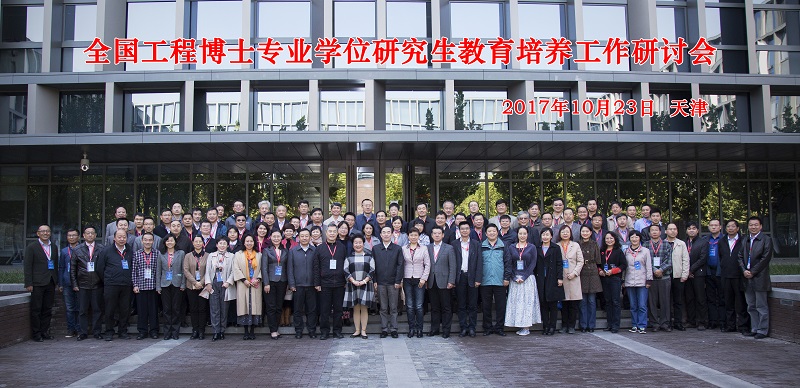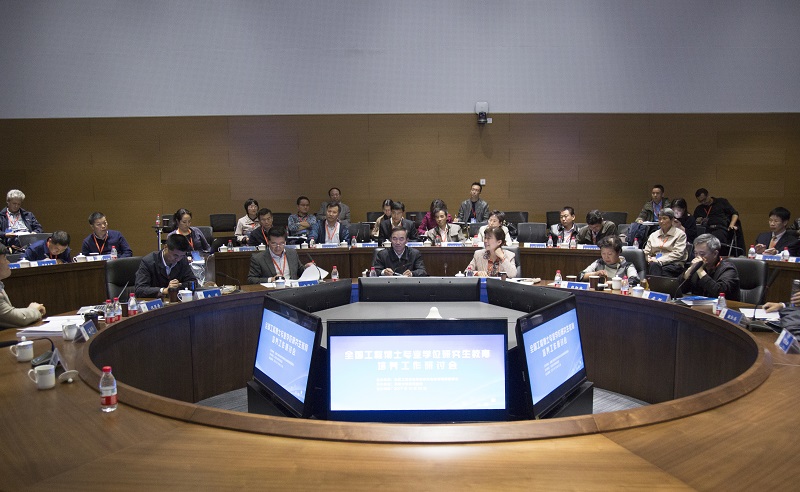Recently, the National Symposium on Doctor of Engineering (Eng. D.) Education and Training, organized by the China National Committee for Engineering Education (CNCEE), was held at Zheng Dong Library at the Peiyang Park Campus, Tianjin University (TJU). Tang Jiwei, Vice Inspector of the Department of Degree Management & Postgraduate Education (DDMPE), Bai Haili, Deputy Director of Tianjin Municipal Education Commission, Wang Shuxin, Vice President of TJU, attended the symposium, along with other members of CNCEE and more than 100 representatives from 24 pilot universities on Eng. D. Education and some other Tianjin universities.

In his speech during the symposium, Bai Haili paid tribute to CNCEE for its great contributions to the development of China's engineering education and looked forward to further advancement.
Wang Shuxin, on behalf of TJU, expressed his warm welcome to all the delegates and introduced to them TJU’s long history of engineering education as well as to the first fruits in Eng. D. cultivation. He said the symposium provided a platform where experts in the engineering field could discuss Eng. D. training and play an active part in promoting the graduates’ education to serve our National Strategy of Innovation-Driven Development.

Twenty-four pilot universities providing Eng. D. Education carried out in-depth discussions on work-in-progress, shared their training experience, put forth current problems and sought for solutions. Zhao Meirong, Executive Vice Dean of TJU’s Graduate School, introduced TJU’s endeavors and achievements over the past two years in Eng. D. enrollment, the training model, quality assurance, among others, and suggested some effective measures on Eng. D. training.
During the symposium, The Plan for Eng. D. Education and Training Model Reforms (Reform Plan) was put forward by CNCEE for discussion.
In the concluding speech, Tang Jiwei spoke highly of the achievements over the last five years by these colleges and universities who had made a series of efforts in Eng. D. Training innovation, including reform of the enrollment system, the formulation of quality evaluation and the degree-granting standards as well as the design of individual training and fine management programs. Eng. D. candidates were jointly cultivated by universities and enterprises, which he believed would be beneficial to the development of science and technology and the construction of an innovative country. “The fact that more than ten students have obtained their Doctorates in Engineering means the previous efforts have paid off.”, he said.
Mr. Tang stressed that the cultivation of Eng. D. should center on the requirements of the new era for leading talent in this field, stay in line with the national strategy of “quickening the pace of building world-class universities and disciplines and bringing forth the full potential of higher education.” Colleges and Universities, as he pointed out, should focus on cultivating high-quality talent and establishing a set of specific and complete systems to strengthen quality control and process management.
He also gave further interpretation of the Reform Plan, which he considered was the summary of the pilot universities’ experience over the past five years. Based on the Eng. D. degree-granting standards, institutions of higher learning would be given more decision-making power in the implementation of personnel training programs.
It was the second time that TJU had organized the Symposium on Eng. D. Education and Training. Held during the critical period for Eng. D. education development, the symposium this year summarized the past five-years work in Eng. D. education and set well-defined goals for Eng. D. training, which laid a sound foundation for further exploration of high-end talent training models and for the advancement of China’s higher engineering education.
By: Wang Qiuju, Wang Kai
Editors: Sun Xiaofang and Ross Colquhoun






